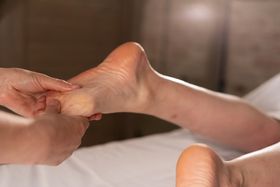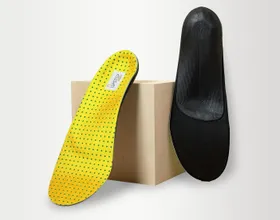How Can Heel Pain From Standing Be Prevented?
Heel pain is a common problem for people who stand for long periods. Learn more on how you can prevent and manage this pain.
Published June 29, 2022
Heel pain is a common problem in people that have to stand for long hours. It can be disconcerting and reduce efficiency at work. While heel pain may be caused by a variety of things, heel pain may also occur because people stand for long periods.
When standing, the feet and leg muscles continue to generate tension to keep you balanced. Over time, this can cause soreness in your muscles. Also, standing reduces circulation and oxygen supply to the feet, further increasing pain. Again, a condition like flat feet can worsen heel pain.
What to Do About Heel Pain When Standing
Heel pain while standing may be inevitable because of work or lifestyle. It is important to know why your heels hurt and what you will need to do to manage the pain. Some of the things that you can do to manage heel pain include:
- Rest Get off your feet whenever possible, relax and elevate your feet. If the pain persists, you can either use NSAIDs, or ice to relieve the pain and control inflammation.
- Massage To aid relaxation of lower limb muscles and relieve pain off your feet.
- Exercises Exercises for heel pain should include stretching and strengthening techniques. Stretching before and after periods of long-standing reduces the level of pain from standing. Likewise, strengthening the muscles builds them up so they can support more tension. Finally, endurance exercises will help prevent easy muscle fatigue.
- Use of custom orthotics These provide additional cushioning and comfort for the feet, and they relieve pressure and tension.
- Wear the right footwear Avoid wearing tight-fitting shoes with limited toe space.
Should You See a Doctor for Heel Pain?
The recovery from heel pain depends on the severity and the promptness of intervention. Generally, relieving heel pain should resolve with rest and conservative treatment. However, if these methods do not relieve your heel pain, please visit a doctor, so that they can assess your condition. The doctor will diagnose the cause of the pain and prescribe the most appropriate treatment.
Related Articles

How to Relieve Plantar Fasciitis Pain Using Pressure Points
Upstep Staff
October 16, 2025

7 Best Insoles to Treat Calf Pain in Athletes
Janik Sundstrom
December 5, 2024

Best Insoles for Pickleball: The Must-Have Inserts for Players
Janik Sundstrom
December 9, 2024

Insoles for Standing and Walking All Day—2026 Review
Babafemi Adebajo
July 15, 2024

Best Insoles for Women's Flats: All-Day Cushioning Comfort
Jasrah Javed
October 14, 2024
Related Posts
Janik Sundstrom
Custom Orthotics for Heel Pain—2026 Review
Janik Sundstrom
4 Tips for Relieving Heel Pain During Pregnancy
Janik Sundstrom
Benefits of Yoga for Heel Pain
Janik Sundstrom
Choosing the Best Insoles for Heel Pain
Babafemi Adebajo
Massages for Heel Spurs: Helpful Tips and Techniques
Dr. Pooja Gajare
Do Orthotic Insoles Work for Heel Pain?
Janik Sundstrom
Heel Pain When Stretching: Causes and Treatments
Babafemi Adebajo



